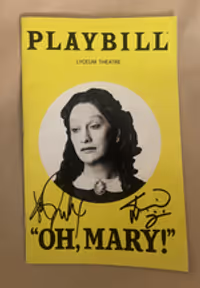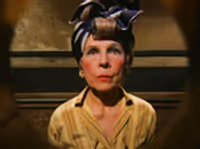Tonya Pinkins' Open Letter to Jesse Green
#1Tonya Pinkins' Open Letter to Jesse Green
Posted: 11/12/22 at 6:26pm
In response to his review of the Public's A Raisin in the Sun:
https://tonyapinkins.medium.com/open-letter-to-jesse-green-of-the-new-york-times-5f897fb8448b
#2Tonya Pinkins' Open Letter to Jesse Green
Posted: 11/12/22 at 8:31pm
Well damn. I've never seen such a thoroughly educational and well-researched evisceration of a theatre critic in my life.
I haven't seen the production, but this actually makes me want to revisit the text.
BoringBoredBoard40
Broadway Legend Joined: 9/27/21
#3Tonya Pinkins' Open Letter to Jesse Green
Posted: 11/12/22 at 9:40pm
she is a total nut
if you think in 2022 that ONE review means the difference between an extension or a broadway transfer you are clueless
this is a good production but the fact is it is not the same one as WTF, and she is no S Epatha Merkinson
that said the review wasn't this brutal take down that she seems to think it is and also this is what, three weeks after the fact?
What a selfish way to pull focus when this production is going into its final week
#4Tonya Pinkins' Open Letter to Jesse Green
Posted: 11/12/22 at 9:50pm
I only read half of it and have it bookmarked to check out, but damn. Very interesting and wish I could see this production now!
BCfitasafiddle
Broadway Legend Joined: 1/25/20
#5Tonya Pinkins' Open Letter to Jesse Green
Posted: 11/12/22 at 10:04pm
She's incorrect regarding a New York Times review making or breaking a show anymore. The vast majority of audiences don't read reviews, but maybe the audience for a show at the Public does. Either way, it's an interesting perspective and a very well thought out and written open letter.
Curious to see if Green responds.
#6Tonya Pinkins' Open Letter to Jesse Green
Posted: 11/12/22 at 10:25pm
Tonya Pinkins writes:
Jesse, HELEN KELLER could have written a more accurate review of the production of A Raisin in The Sun we deliver at the THE PUBLIC THEATER through November 20, 2022.
"Helen Keller could have written a more accurate review". I think that's kind of an offensive thing to say.
VintageSnarker
Broadway Legend Joined: 1/30/15
#7Tonya Pinkins' Open Letter to Jesse Green
Posted: 11/12/22 at 10:38pm
I gave up around the Misogynoir section when I saw how long it was; I'll read the rest later. But I do think it was interesting in light of the recent BWW article on the need for diversity in theater criticism which I did very much enjoy.
But, you know, let's not forget all of this: https://forum.broadwayworld.com/readmessage.php?thread=1125809
#8Tonya Pinkins' Open Letter to Jesse Green
Posted: 11/12/22 at 10:57pm
Considering how much this board hates Tonya Pinkins' opinions, I'm surprised how mild these responses are - but I'm sure the worst are yet to come.
Anyway, I did read the whole thing, over the course of 2 sittings.
Aside from a few questionable bits like the ones mentioned above (the Helen Keller bit, and the bit about the impact of the review) - this is a wildly compelling piece. What a roller-coaster. Pinkins' insight and dramaturgical analysis is on a whole other level. I haven't always agreed with everything she's said, but she's extremely intelligent, and I respect her chutzpah.
PipingHotPiccolo
Broadway Legend Joined: 6/13/22
#9Tonya Pinkins' Open Letter to Jesse Green
Posted: 11/13/22 at 1:19am
i admire her chutzpah and shes a good writer. but some of this is gibberish, and overall it feels frankly childish to go after a critic who didnt like your show. I re-read Green's review and it wasn't harsh, or thoughtless. And since he (and the NYT) praised this very production in Williamstown, the whole "another racist who cant stand powerful Black women" is just nonsensical.
#10Tonya Pinkins' Open Letter to Jesse Green
Posted: 11/13/22 at 2:38am
I have a few questions,
1) What is the beef between Kushner and Brantley? Can someone spill the beans plz? :)
2) "But history and data have shown that capitalists will even forego profit if it involves uplifting the global majority and particularly Black people." I would love to see the data and "history" that support the argument.
#11Tonya Pinkins' Open Letter to Jesse Green
Posted: 11/13/22 at 9:57am
Dancingthrulife2 said: “2) "But history and data have shown that capitalists will even forego profit if it involves uplifting the global majority and particularly Black people." I would love to see the data and "history" that support the argument.”
I’m honestly wondering if this part was satire.
This whole thing made me remember a song Alison Luff wrote with her husband in response to Jesse Greens review for Escape to Margaritaville. It’s a beautiful song
PipingHotPiccolo
Broadway Legend Joined: 6/13/22
#12Tonya Pinkins' Open Letter to Jesse Green
Posted: 11/13/22 at 10:13am
Dancingthrulife2 said: "I have a few questions,
1) What is the beef between Kushner and Brantley? Can someone spill the beans plz? :)
2) "But history and data have shown that capitalists will even forego profit if it involves uplifting the global majority and particularly Black people." I would love to see the data and "history" that support the argument.
"
youll be waiting quite some time before you get any such data. its a hysterical comment. the whole piece is, really. Jesse Green, who championed Caroline or Change last year, hates shows about Black women, and the proof is that his predecessor didnt like Caroline or Change 15 years ago? Are we taking seriously a piece whose thesis turns solely on whether the NYT liked shows that Tonya Pinkins herself was in?
#13Tonya Pinkins' Open Letter to Jesse Green
Posted: 11/13/22 at 10:18am
Pinkins is often her own worst enemy and the sentence "But history and data have shown that capitalists will even forego profit if it involves uplifting the global majority and particularly Black people" makes no sense (surely she did not mean to say that capitalists will forego profit it it involves uplifting Black people) but it is flabbergasting to me that there are people on this board who are blind to the documented history of systemic racism in (as relevant here) the theatre. Is the production above criticism? No. Does Jesse Green have a problem understanding "race" in his reviews? Yes. Does Tonya Pinkins write cogently or effectively about this issue? Nope.
#14Tonya Pinkins' Open Letter to Jesse Green
Posted: 11/13/22 at 10:40am
Hogan as usual succinctly cuts to the point on this. I’m not a big fan of Green as a critic, as his mixture of blind spots and peculiar prudish or even snobby inclinations have lead to a rather odd spectrum of reviews. But Pinkins’ essay is a hard read- hard in the sense that it’s meandering, poorly structured, full of leaps of logic, and often seems to be linking personal grievances to the issue of racism in the industry.
And the “Brantley hates Kushner” bit is certainly news to me, and a distracting anecdote to throw in.
PipingHotPiccolo
Broadway Legend Joined: 6/13/22
#15Tonya Pinkins' Open Letter to Jesse Green
Posted: 11/13/22 at 10:56am
HogansHero said: "Pinkins is often her own worst enemy and the sentence"But history and data have shown that capitalists will even forego profit if it involves uplifting the global majority and particularly Black people" makes no sense (surely she did not mean to say that capitalists will forego profit it it involves uplifting Black people) but it is flabbergasting to me that there are people on this board who are blind to the documented history of systemic racism in (as relevant here) the theatre. Is the production above criticism? No. Does Jesse Green have a problem understanding "race" in his reviews? Yes. Does Tonya Pinkins write cogently or effectively about this issue? Nope."
To be clear, shes saying Green has a problem understanding race in his reviews, and her evidence of it is his review of this production of Raisin. She also blames Ben Brantley for destroying Caroline or Change based on his review of that show and his feud with Tony Kushner. So this isnt about Jesse Green, per se, its about all the white men at the NYT who are hell-bent on destroying anything that lifts up Black women.
And its galling that this thesis isnt readily rejected when you look at the various works uplifting Black women--including the VERY WORKS PINKINS IS WRITING ABOUT/WAS IN-- that Green/Brantley have praised, championed, etc. etc. If Green "has a problem understanding race" surely one would rely on evidence of it beyond "he didnt like me in this show that I was hoping would transfer to Bway" and would at least grapple with/recognize his effusive praise for.... the very show she accuses Brantley of detesting along similar lines?
its nonsensical through and through
and to say "this essay makes no logical sense" or "jesse green's documented writings disprove the thesis here" is NOT to say there hasnt been systemic racism in the theater. there has, and i'm betting Tonya Pinkins has seen it firsthand. but she chose to write about systemic racism in Jesse Green articles. and she has come up very short there.
#16Tonya Pinkins' Open Letter to Jesse Green
Posted: 11/13/22 at 12:46pm
PipingHotPiccolo said: "she has come up very short there."
She has and it is thus a wasted opportunity. At first blush, a lengthy article in Medium (with footnotes, no less) appears as a work of scholarship. But it isn't. It reads like a stream of consciousness rant with a lot of non-sequiturs. The Brantley thing, I believe, originated with a weak-on-causation claim based on the 2004 Pulitzer neglect of Caroline. (Brantley chaired the drama committee that year.) Regardless of the merits of the Brantley/Kushner question, it's a great example of a sidebar that does not appear to have a developed nexus to any thesis in the article. There remains a very profound article on this subject that would actually make some searing points.
JasonC3
Broadway Legend Joined: 4/22/21
#17Tonya Pinkins' Open Letter to Jesse Green
Posted: 11/13/22 at 12:59pm
I'm torn again between "writers should express themselves as they see fit" and "I'm not sure this is the way to persuade people of some valid assertions."
Updated On: 11/13/22 at 12:59 PM
Dolly80
Broadway Legend Joined: 5/15/11
#18Tonya Pinkins' Open Letter to Jesse Green
Posted: 11/13/22 at 10:26pmShe’s full of herself. How dare someone not love a show she’s in. I hope he ignores it.
PipingHotPiccolo
Broadway Legend Joined: 6/13/22
#19Tonya Pinkins' Open Letter to Jesse Green
Posted: 11/14/22 at 12:11am
JasonC3 said: "I'm torn again between "writers should express themselves as they see fit" and "I'm not sure this is the way to persuade people of some valid assertions.""
im not sure what the conflict is in those two sentiments: she has every right under the sun to write whatever she wants, and make whatever accusations/insinuations she wants, in this (hanging on by a thread) free country. no one (certainly not I, but no one else here) has suggested otherwise, or even hinted at it.
and just as its her right to spout off about whatever she wants, its our right to spout right back, and point out how shes persuaded absolutely nobody of anything with this whiny drivel.
JasonC3
Broadway Legend Joined: 4/22/21
#20Tonya Pinkins' Open Letter to Jesse Green
Posted: 11/14/22 at 12:24am
^ I was speaking for myself and not referencing anyone else's comments here, something I thought was pretty clear given my use of "I" twice. It was about my own internal reaction and thinking.
Updated On: 11/14/22 at 12:24 AM
PipingHotPiccolo
Broadway Legend Joined: 6/13/22
#21Tonya Pinkins' Open Letter to Jesse Green
Posted: 11/14/22 at 12:35am
but you used the word "torn" as if there was a conflict between the two, which i don't follow. thats all.
VintageSnarker
Broadway Legend Joined: 1/30/15
#22Tonya Pinkins' Open Letter to Jesse Green
Posted: 11/14/22 at 5:42am
I went back to finish reading it.
Your review says, “O’Hara concentrates his prodigious theatrical imagination on Walter Lee.” [...] You saw us as Walter Lee sees us. You focus on Black male brokenness rather than all the Black women’s strength.
I do think it's fair for her to critique him if his bias led him to focus on the male character regardless of how the production presented the script. And she makes interesting points about trying to accept a revival as a new interpretation of the text rather than comparing it to canonically accepted story of past productions.
An important lesson for all theater goers, critics, actors, directors, teachers: the stage directions in a script are just what the stage manager of the first production remembered to write down. They may not be what the playwright wrote. Good actors block them out at the start of rehearsal.
Interesting...
Walter Lee has seen the mask of whiteness in white restaurants and limousines and he aspires to it; yachts and pearls. Lena, Ruth and Beneatha have seen the underbelly of whiteness. They wash white peoples ‘drawers’ and they have no aspirations to any part of that. If Walter Lee suffers any “distress” it is foolishness, immaturity, and the aspiration to too low a standard for a family with so much pride and integrity. [...] It is understandable that the play, which is a critique of male mysogyny was sold as the story of a tragic black man’s dreams.
This does sound like a compelling reading of the play.
For the New York Times to uplift Black story it must pay tribute to white story, value and imagination. [...] Few get to tell authentic African diaspora stories in the commercial theater if the story doesn’t center whiteness or fit the limited white imagination of Blackness. [...] I have witnessed this at almost every institution I’ve taught in, white teachers training black artists out of their authenticity and into something they the teachers can manage and feel comfortable with.
Outside of this, the letter goes off into tangents of ego and personal grievance. They don't hold up as evidence. I agree that she makes worthwhile points but you have to dig for them.
JasonC3
Broadway Legend Joined: 4/22/21
#23Tonya Pinkins' Open Letter to Jesse Green
Posted: 11/14/22 at 7:38am
PipingHotPiccolo said: "but you used the word "torn" as if there was a conflict between the two, which i don't follow. thats all."
There is inherently a conflict between letting people speak as they wish and wishing they would speak differently. That's all I was trying to say about me feeling torn between the two.
#24Tonya Pinkins' Open Letter to Jesse Green
Posted: 11/14/22 at 9:05am
JasonC3 said: "PipingHotPiccolo said: "but you used the word "torn" as if there was a conflict between the two, which i don't follow. thats all."
There is inherently a conflict between letting people speak as they wish and wishing they would speak differently. That's all I was trying to say about me feeling torn between the two."
I don't think many people had difficulty following what you were saying. (I didn't.)
LarryD2
Broadway Legend Joined: 9/1/14
#25Tonya Pinkins' Open Letter to Jesse Green
Posted: 11/14/22 at 10:24am
As with everything Tonya writes, there's a handful of compelling points, an even larger sprinkling of truly ludicrous accusations, a series of "facts" she's invented from whole cloth, with everything anchored in her own convictions and biases. When she takes pen to paper, she often comes across as her own worst enemy.
Videos








